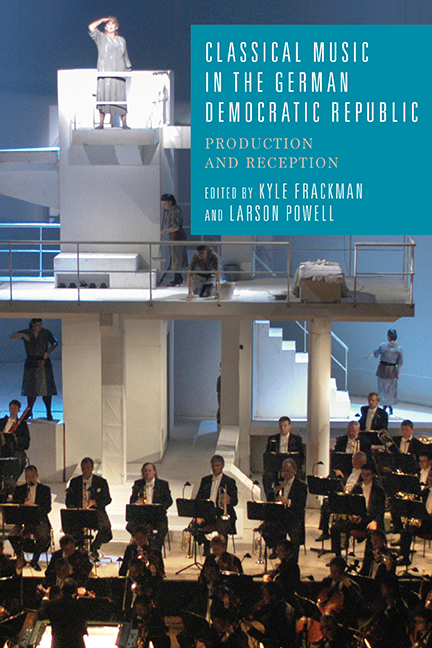Book contents
- Frontmatter
- Contents
- Acknowledgments
- List of Abbreviations
- Introduction: Music and Heritage in the German Democratic Republic
- 1 Provincialism, Modernity, and the Classical Heritage: The Administrative Structure of the GDR and the Situation of Music Production
- 2 Classicism as Anti-Fascist Heritage: Realism and Myth in Ernst Hermann Meyer’s Mansfelder Oratorium (1950)
- 3 Positioning Georg Knepler in the Musicological Discourse of the GDR
- 4 Ehrt euren Deutschen Meister: Reproducing Wagner in the GDR
- 5 The Embodiment of Collective Memory in Neue Odyssee
- 6 Marxism and Feminism in Ruth Berghaus’s Staging of Don Giovanni
- 7 Beyond the Gewandhaus: Mahler and the GDR
- 8 Hanns Eisler’s Funeral and Cultures of Commemoration in the GDR
- 9 Exile—Remigration—Socialist Realism: The Role of Classical Music in the Works of Paul Dessau
- 10 “What a Satisfying Task for a Composer!”: Paul Dessau’s Music for The German Story (. . .Du und mancher Kamerad)
- 11 Friedrich Schenker and the Third Way
- 12 A Prism of East German Music: Lothar Voigtländer
- Notes on the Contributors
- Index
2 - Classicism as Anti-Fascist Heritage: Realism and Myth in Ernst Hermann Meyer’s Mansfelder Oratorium (1950)
Published online by Cambridge University Press: 21 May 2021
- Frontmatter
- Contents
- Acknowledgments
- List of Abbreviations
- Introduction: Music and Heritage in the German Democratic Republic
- 1 Provincialism, Modernity, and the Classical Heritage: The Administrative Structure of the GDR and the Situation of Music Production
- 2 Classicism as Anti-Fascist Heritage: Realism and Myth in Ernst Hermann Meyer’s Mansfelder Oratorium (1950)
- 3 Positioning Georg Knepler in the Musicological Discourse of the GDR
- 4 Ehrt euren Deutschen Meister: Reproducing Wagner in the GDR
- 5 The Embodiment of Collective Memory in Neue Odyssee
- 6 Marxism and Feminism in Ruth Berghaus’s Staging of Don Giovanni
- 7 Beyond the Gewandhaus: Mahler and the GDR
- 8 Hanns Eisler’s Funeral and Cultures of Commemoration in the GDR
- 9 Exile—Remigration—Socialist Realism: The Role of Classical Music in the Works of Paul Dessau
- 10 “What a Satisfying Task for a Composer!”: Paul Dessau’s Music for The German Story (. . .Du und mancher Kamerad)
- 11 Friedrich Schenker and the Third Way
- 12 A Prism of East German Music: Lothar Voigtländer
- Notes on the Contributors
- Index
Summary
THE PRESENT ESSAY DEALS WITH the complicated relations between Marxist aesthetics and the classical heritage as reflected in the work of Ernst Hermann Meyer (1905–88), a composer and musicologist from East Berlin. Largely forgotten today, Meyer was among the most powerful figures in the cultural and musical life of the GDR. The author of numerous publications in musicology and music aesthetics, he was also a major theorist of socialist realism and Marxist music historiography. This essay concentrates on his political oratorio Mansfelder Oratorium composed in 1950 to a libretto by Stephan Hermlin (1915–97). The subject matter of the oratorio is the history of the German peasantry and proletariat from the Middle Ages to the founding of the GDR.
While certainly not Meyer's most sophisticated work, the Mansfelder Oratorium gives an exceptionally articulate expression of two central tenets of the official Marxist-Leninist worldview of East German culture, namely, the aesthetics of socialist realism and the GDR's national myth of antifascist resistance. Both of these are held together in Meyer's work, I argue, by a peculiar notion of classicism that reverberates with historical, aesthetic, and ethical implications. Although it is hard to determine its real scope of influence, the Mansfelder Oratorium was held in high regard by the East German political and cultural establishment; it was widely performed in the first decades of the GDR and was taught in music lessons in schools. Rather than analyzing the piece in detail, I will focus on Meyer's and Hermlin's musical and literary treatment of two historical events: the German Peasants’ War in the sixteenth century and the rise to power of Adolf Hitler and the Nazis four centuries later.
A methodological word of caution is in order before we begin. From the perspective of compositional history, Meyer's artistic achievements may seem insignificant to us. Although he was active in a time of rapidly growing musical experimentalism, he shared none of the atonal and serial radicalism of his generation's avant-garde.
- Type
- Chapter
- Information
- Classical Music in the German Democratic RepublicProduction and Reception, pp. 34 - 57Publisher: Boydell & BrewerPrint publication year: 2015
- 1
- Cited by



